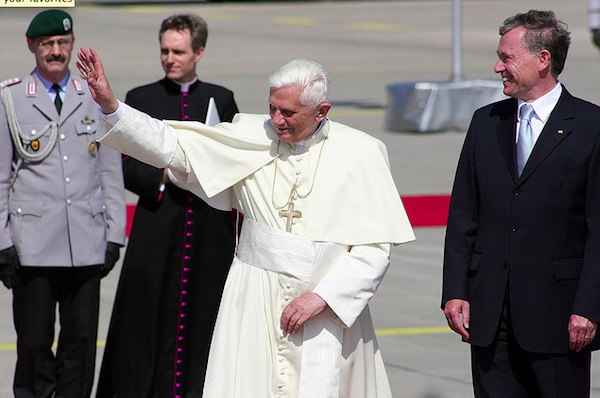Pope Benedict XVI’s Legacy Will Help Determine His Successor
Image Credit: Andre Ballensiefen via Flickr
Pope Benedict XVI’s decision to resign has arguably become the single most discussed act of his pontificate. Although permitted by Canon Law, papal resignation is extremely uncommon—Benedict will become one of only six popes in the history of the Catholic Church to resign, and the first to do so in nearly 600 years. The world’s one billion Catholics, of whom roughly two million live in the Archdiocese of Boston, are now speculating the implications for the future of the papacy. James Conn, S.J, Visiting Professor of Canon Law in the School of Theology and Ministry at Boston College, offered us a few of his takeaways.
1. The Pope’s resignation—although sudden—was not wholly unexpected.
“Its immediacy took me by surprise,” says Conn. Although his plans for resignation were likely in the works for months, there were no leaks from inside the Vatican or substantial rumors precipitating the announcement.
“But it’s something that I would never have said was out of the realm of possibility or of likelihood,” says Conn, pointing to Benedict’s discussion of papal resignation in an interview with Peter Seewald, a German journalist, which was later published in Seewald’s 2010 book, Light of the World: The Pope, the Church and the Signs of the Times.
“If a Pope clearly realizes that he is no longer physically, psychologically, and spiritually capable of handling the duties of his office,” said Benedict, “then he has a right and, under some circumstances, also an obligation to resign.”
2. His resignation isn’t part of some larger conspiracy—it’s because he’s getting old.
“I don’t think anything’s hidden here,” says Conn, dismissing the speculation surrounding the reasons for Benedict’s departure. “He’s reached a point in his life where he doesn’t have the physical and mental strength to continue. The idea that it’s anything beyond that, or anything sinister—I think that’s nonsense.”
“Lifelong office isn’t what it used to be,” says Conn, who explains that earlier popes had a much shorter life expectancy — and a much shorter pontificate—because of disease and the danger that was inherent to holding the position in the early history of Christianity, when its practice was illegal in Ancient Rome. They often died before reaching advanced age and the challenges of the office became too much for them.
“The requirements of the pope’s ministry are today very different than they used to be,” adds Conn, pointing to the increased demands of the position—like frequent international travel—and the increased complexity of the issues with which the pope is faced. “Both render the possibility of resignation a much more reasonable thing.”
3. His departure has broken the taboo of papal resignation, setting a precedent for future popes.
Serving as pope has traditionally been viewed as a lifelong commitment, as exemplified by Benedict’s predecessor, Pope John Paul II, who continued to serve even as he struggled with advancing Parkinson’s disease. “He felt that bearing his sufferings and his illness with equanimity was a teachable moment. It was held up as a value,” says Conn.
“But it’s also a value to step aside when you know that you don’t have the strength to carry on adequately,” says Conn, expressing the sentiment of those who praise Benedict’s resignation as a principled decision made in the interests of the Catholic Church.
“His decision makes it more possible for others to make similar decisions,” says Conn. ”Whether or not it would compel them to make similar decisions is another matter.”
4. It’s unlikely he will have a direct influence on the upcoming papal election, or on the pontificate of his successor.
Benedict plans to retire to his summer home outside of Rome when he leaves the papacy, and eventually to move to a convent within the walls of Vatican City.
Although some speculate that this will put him in a position to influence the upcoming papal election—especially because of the allegiance that the cardinals swore to him when he was ordained as pope—Conn disagrees. “The cardinals will no longer owe allegiance to him after his office is over,” he explains.
“My feeling is that he will be a model bishop emeritus,” says Conn. “Look around the country and the world at its retired bishops, and the number that have left their successors free to exercise their office and their ministry. Benedict will be a model of that.”
5. But his legacy will absolutely have an indirect effect on who is chosen as his successor.
Benedict has been considered a scholarly introvert lacking the charismatic charm and widespread appeal of his predecessor, John Paul II.
“One of the factors that the cardinals in the conclave will consider, is that the kind of pope we want?”
But the most important issue going forward is not whether the new pope should be introverted or extroverted, says Conn. It’s also not whether he should be liberal or conservative, or whether he should be from a developing country or an established one.
“It’s going to be a much more profoundly faith-based issue,” he says. “What in the church’s preaching and service could draw the unchurched to faith and practice, and to call back those who have fallen away?”
That question will dominate the discussion when the 120 cardinals under the age of 80 meet in the Vatican next month to elect a new pope. And whoever is determined as best able to answer it will become the new leader of the Catholic Church.



